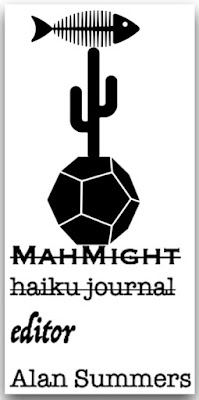Saturday, 27 November 2021
Joseph P. Wechselberger and Elliot Nicely and the milk of human kindness
Wednesday, 24 November 2021
Alan Peat and Réka Nyitrai lunar and solar scapes, and invent a new kigo competition news!
she feels for an eye
with her fingers
Alan Peat's favourite haiku by another writer:
February silence —
an old woman knits her sunset
page 93
https://otatablog.files.wordpress.com/2019/03/otata-39-may-2019-final2.pdf
‘Withnail and I’ quote:
You bloody fool. You should never mix your drinks.
https://biddulph.co.uk
Alan Summers
https://thehaikufoundation.org/reka-nyitrai-touchstone-distinguished-books-award-winner-2020/
https://www.youtube.com/watch?v=oP1UwhI17Gs
https://www.youtube.com/watch?v=b0FzWMEp6_w
Sunday, 21 November 2021
Richard Matta and Debbie Strange in the lightning zone
Richard Matta says:
“As it turns out, Waiting for Godot was my favorite play in high school. I remember where my mother and I sat for the performance.”
unanswered proposal…
a teetering kite awaits
the wind
Richard Matta
Richard says:
"How long the wait for the wind as the kite balances on its edge, possibly falling forward or back, but either way requiring us to start over. Patience is required, and acceptance we are not in control, just as a proposal, say for marriage, puts us in a holding pattern…with hopes to soar."
Richard choose:
Richard comments:
“Having lived in Florida I know lightning and can relate to the wildness of the sky. The assonance in tethered and earth is wonderful, and the use of tethered and wild certainly makes one think of a wild monster with which you might try to use a chain.”
Waiting for Godot:
“Better hope deferred than none.”
Withnail and I:
“What about what’s-his-name?”
Notes:
Richard L Matta
Richard Matta was raised in New York’s Hudson Valley and now lives in San Diego, California. He practiced forensic science after attending university. Most often he’s on or near the water, sailing or walking along the bay, usually with his golden-doodle dog. His walks provide the inspiration for his haiku and other poetry. His poetry has appeared in Healing Muse, Dewdrop, and Ancient Paths. He’s a practiced forensic science after attending Notre Dame. He is active in San Diego poetry circles.
https://thedewdrop.org/isolation-shorts/#richard-matta
Debbie Strange
“These exquisite poems illuminate the skill of the author in pairing haiku and tanka in conversation, one page at a time. On one page, the long ago past talks to the recent past. On another, the sorrow of the natural world is juxtaposed with that of the human world.”
— Roberta Beary, final judge
https://www.amazon.co.uk/dp/B08RZFYY5G/ref=dp-kindle-redirect?_encoding=UTF8&btkr=1
https://debbiemstrange.blogspot.com/p/book-language-of-loss.html
SEE ALSO
Friday, 5 November 2021
Marcie Wessels and Keith Polette
The New World
three one-line haiku by Keith Polette
Monday, 1 November 2021
Issa and Eva Zimet
so high up, beyond reach,
birds call out there
Eva’s statement
“He was introduced to me as Rinpoche. Six months like this, he said, holding his wrists together in front. And six months like this, his wrists together behind. And then he repeated the gestures. The window was very high and small, but it was enough to share with the birds in the sky, and keep him alive.”
Eva’s favorite haikai poem by Kobayashi Issa
How much
are you enjoying yourself,
tiger moth?
translation by Robert Hass
https://inpressbooks.co.uk/products/the-essential-haiku-versions-of-basho-buson-and-issa
Eva says:
And thus the gist of the haiku, I think, is the narrator jealous?
Waiting for Godot
Pozzo (to Vladimir): Are you alluding to anything in particular?
“I” (to uncle Monty): Perhaps it’s in the other bag.
小林 一茶
with fire such fun...
tiger moth?
http://haikuguy.com/issa/search.php




























